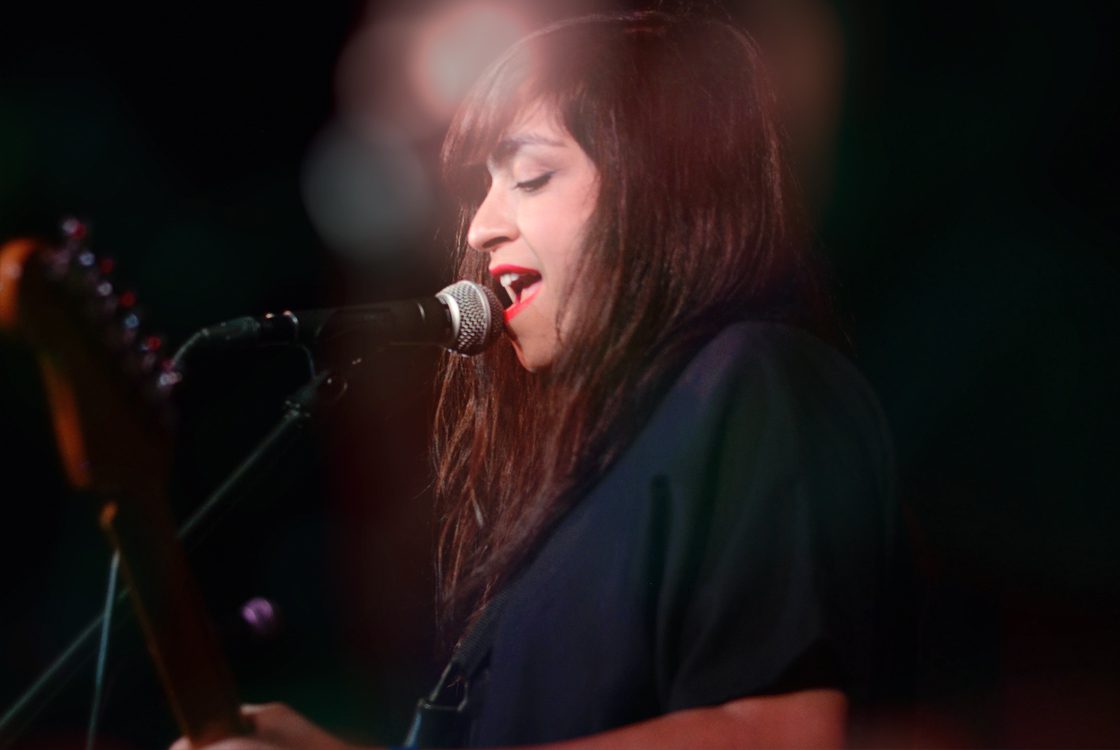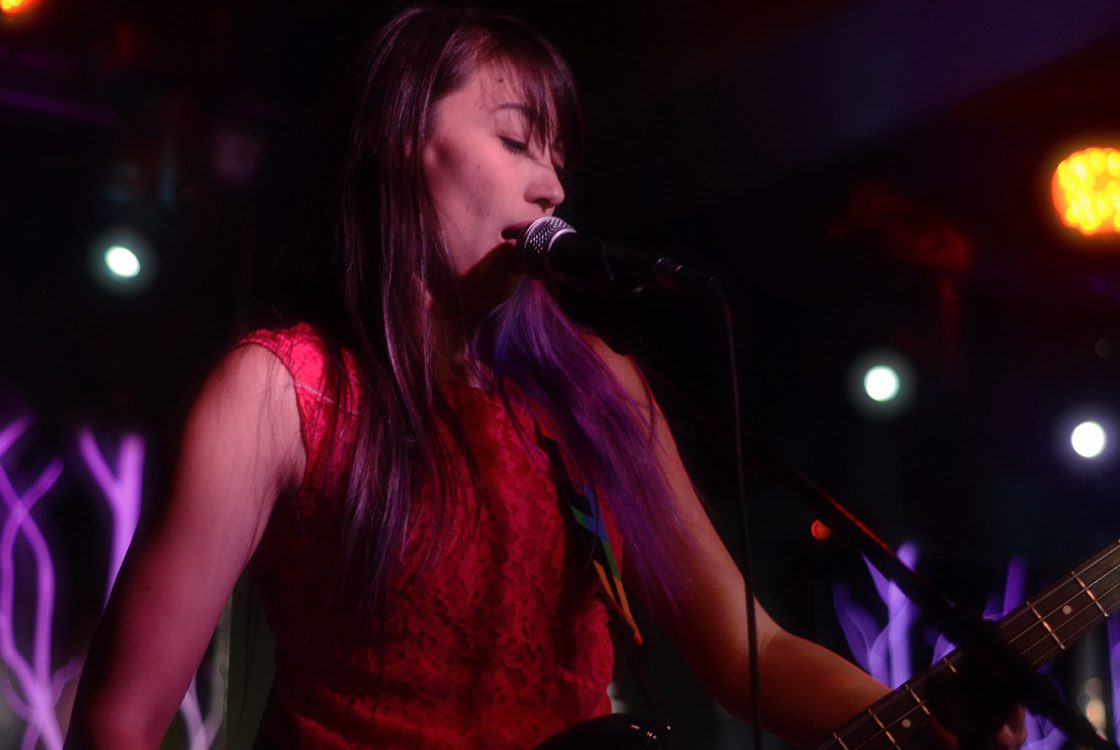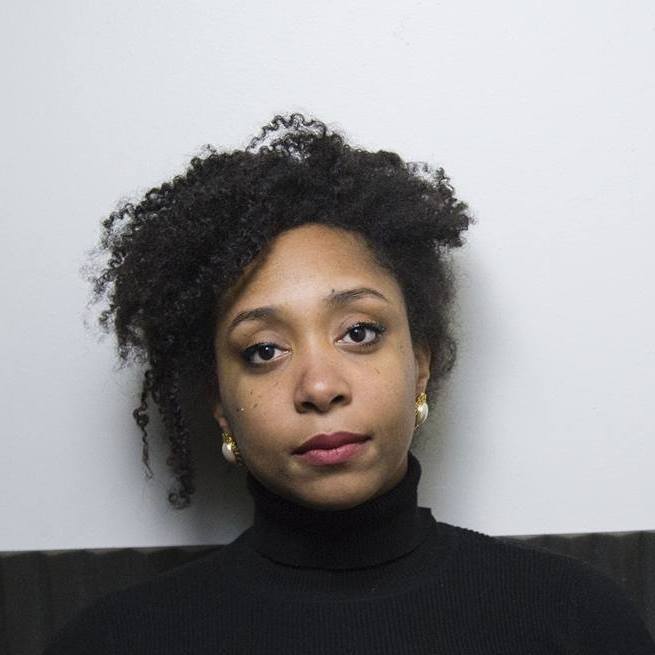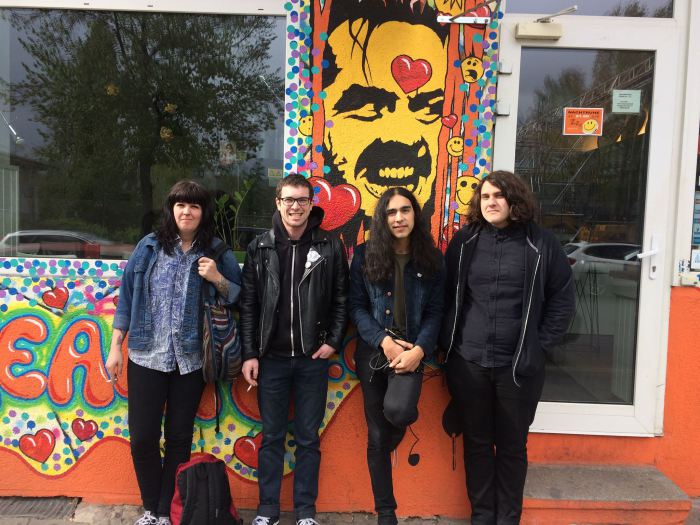
Out of the 90 minutes I spend talking with didi, 30 are consumed by parking troubles. Circling foggy blocks in the Richmond District ahead of the group’s San Francisco show, guitarist/vocalist Meg Zakany tries fitting their tour van into one tiny spot after another, only to eventually find that the reserved load-in space has been taken by another desperate Bay Area driver. I can’t imagine a more fitting SF interview backdrop. And though the bulk of our conversation takes place before and after the time spent crowded into their car, these moments of pause and half-heard conversation are some of the most intimate I record. The car is cocoon-like, hushed and warmed by fabric hung into the back seat, and decorated with bottles of rose water. During tour, Zakany explains, “we all take turns driving, and we all take care of each other in that way. Sometimes there’s back rubs, [or] aromatherapy.”
didi and I have each gone out of our way to be in California this summer: myself taking half of my break from grad school to visit my home in the Bay Area, and didi scheduling their tour around visiting the West Coast. “We just did so well on the West Coast last tour–the reason we did twelve hour drives is to come out here,” vocalist/guitarist Kevin Bilapka-Arbelaez tells me. And so we meet each other, for the first time, outside of Columbus, Ohio, though Columbus is where we’re all spending the most time these days. Columbus is also where didi formed, five years ago, and where they released their self-titled debut. Since then, the band’s lineup–vocalist/bassist Leslie Shimizu and drummer Sheena McGrath join Zakany and Bilapka-Arbelaez–hasn’t changed, and neither has their dedication to each other. But much else has. “Five years in a person’s life is huge,” Zakany tells me. “In each of our lives individually, so much has changed. We’ve been through a lot: moving out of state, moving houses, ceremonies… we’ve been there with each other through all of that.”
While we talk, I notice again and again how the band communicates care to one other. They know each others’ sleep schedules, and do their best to divide tour duties equally. Zakany tells me how instrumental Shimizu has been in ensuring each member eats regularly over tour; after, I hear Shimizu ask her bandmates when they plan on getting dinner. When didi gives interviews, they make sure the whole team is present. Listening to them build off of one another, acknowledging each other’s strengths, adding on to and affirming their bandmate’s thoughts–I feel like I have been brought into their process. didi speaks to one another as though constructing a musical arrangement, paying attention to the rise and fall of each members’ contribution, pushing forward and falling back as needed. “It’s something that is important to us in general,” says Shimizu, “having all of the voices be heard in a group.”
While playing, McGrath says, “we ask each other for a lot of feedback. I think that’s a really important way in which the group is just checking itself.” Just as their conversations are, didi’s musical method is collaborative. As a new song develops, members will construct musical parts, send them to whomever initially brought the track, see if it fits, and then try the arrangement live. “We don’t really write parts for each other,” Bilapka-Arbelaez says. “Part of what I like about this band is that we all have very big personalities, but we all make room for each other.” The process isn’t always easy. Sometimes, Shimizu says, song processes will take rounds and rounds of collaborative trial and error. But they continue to center collaboration, says Shimizu, “because we care. That’s kind of what really comes across. That’s didi.”
Consistently, the band tells me, moments of personal instability have been balanced by their commitment to didi’s music. “[didi] is like my rock,” says McGrath. Back in 2013, when they first came together as a band, explains Bilapka-Arbelaez, “we were trying to figure out what our sound was. But now, us together is our sound. We love each other, and we love what we’re doing,” he says. “[We] know that it’s something that we do well together, and something we each contribute something really important to.”
Shimizu agrees. “It’s something that can actually give us strength now that we look up and say, yeah, we’ve been a band for five years. It’s something that gives us motivation and the course to keep going. If we can do five years, we can do forever.”
Yet growth, even when collectively supported, is never painless. With years of touring, interviewing, and art making under their belts, didi has learned, out of necessity, how to navigate working in an industry largely unsupportive of women and people of color. On tour, Zakany says, “You can observe the ways in which people have been socialized, for example, by the way that they carry themselves, and interact with other people.” When somebody doesn’t have “experience with people like us, a band like us or a person like us,” Zakany notices it.
didi notices, too, when the conversation around their music rings only a single note: asking them to describe the band in terms of marginalized identity. “We recognize how important it is to have those shared experiences with artists, and to be represented,” says Zakany. “We all want to see ourselves represented in music, but I don’t know, sometimes that just takes over the conversation.”
“I do think a lot about the idea of choosing when to talk about the things that I struggle with,” says Bilapka-Arbelaez. “Me being onstage, as I’m going to be tonight, and introducing two songs that are very important to me, is different than having something come out that like, really focuses on that identity and essentializes it. think I want authenticity more than I want brand recognition.”
“So many things that you do, and that we do, as a team, as women, [is] taking care of each other,” says Zakany. “We have a big guard up. And we have to, because we have to protect each other.”
Like Memory Foam, the band’s second album, has come out of all of this: from years of changes to their lives, their deepening connections to each other, and their experiences as musicians. When they decided on a title for the album, says Bilapka-Arbelaez, “We were talking about how different experiences can leave imprints in our lives and in the way we live our lives. A lot of the songs [on the album] are about those experiences that leave imprints on who we are.” Who they are, not just as individuals, but as a band, is something integral to didi’s artistic approach. Because they can’t speak to each other’s lived experiences, says Shimizu, didi focuses on making decisions as a group. “I can’t put into words why Kevin, for example, may have written a song in Spanish, or why Meg was envisioning this thing with [her] family,” she says. “The songs are personal to each person in a different way.”
Like Memory Foam, which had a soft release in Columbus last week, is different than didi’s first album in several ways. This time, the album will be released on a label, Damnably Records. The group has introduced new instruments, as well: percussive pieces, cello, and synth meant to “make the lyrics come alive with the music,” Shimizu says. “We spent a lot of time in the studio this time around. We had time to sit on the parts, and think about them, and play them over and over.” The result is an album which manages to be both lyrically diverse and emotionally cohesive. “I don’t think that we sat down and were like ‘what’s the concept of this album gonna be?’” says Bilapka-Arbelaez. “The through-line [of the album] is just that it’s personal to each of us, in that we each wrote songs that delved into things that we were dealing with at the time, and then musically we all helped each other sort of parse that out, and express it.”
Overall, says McGrath, as didi has spent time learning and living and making together, “We’ve learned a lot about how we are supported and what we draw strength upon in ourselves. You’ve got to find a balance between when to do it yourself and when to reach out.”








